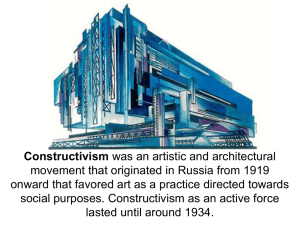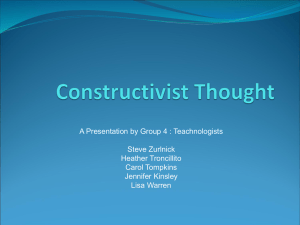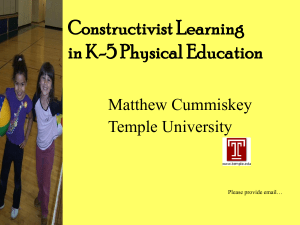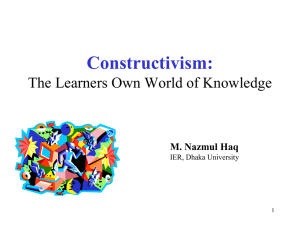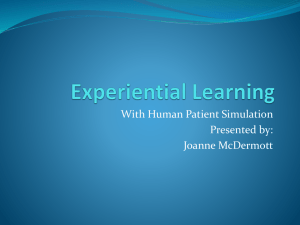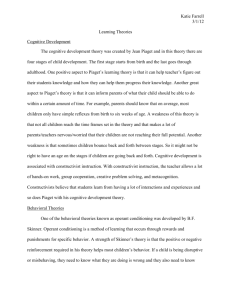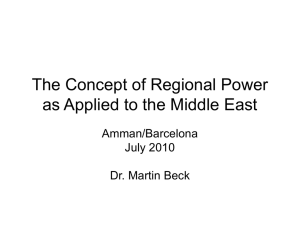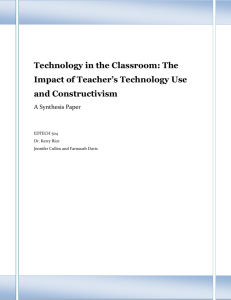178-380 (2)-grades
advertisement
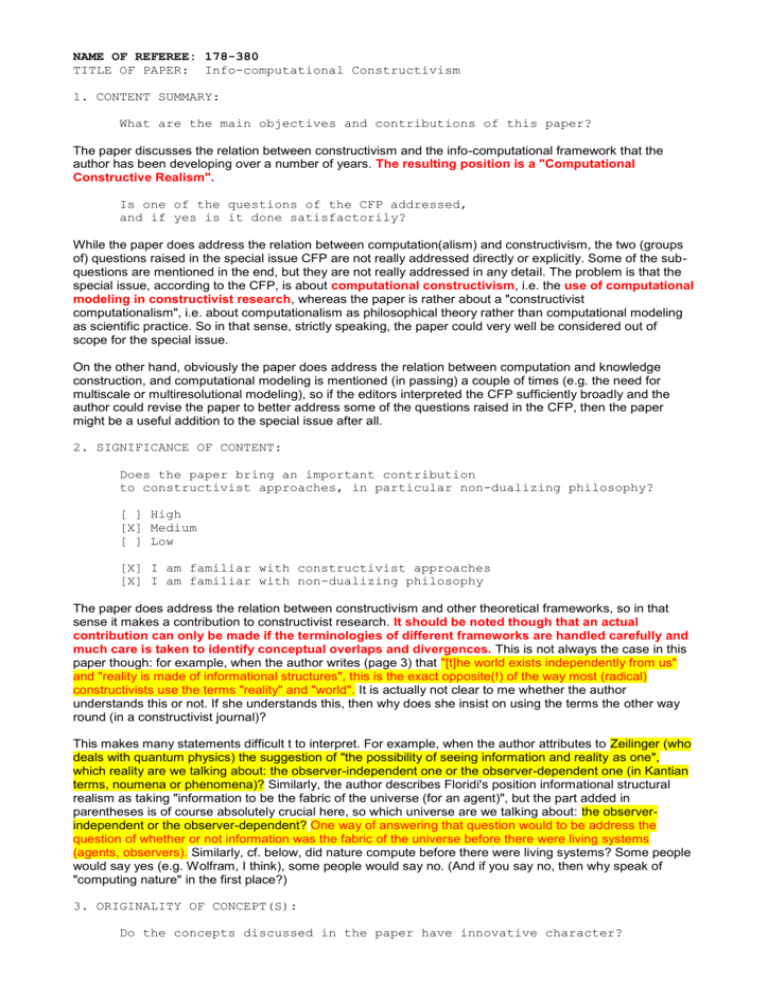
NAME OF REFEREE: 178-380 TITLE OF PAPER: Info-computational Constructivism 1. CONTENT SUMMARY: What are the main objectives and contributions of this paper? The paper discusses the relation between constructivism and the info-computational framework that the author has been developing over a number of years. The resulting position is a "Computational Constructive Realism". Is one of the questions of the CFP addressed, and if yes is it done satisfactorily? While the paper does address the relation between computation(alism) and constructivism, the two (groups of) questions raised in the special issue CFP are not really addressed directly or explicitly. Some of the subquestions are mentioned in the end, but they are not really addressed in any detail. The problem is that the special issue, according to the CFP, is about computational constructivism, i.e. the use of computational modeling in constructivist research, whereas the paper is rather about a "constructivist computationalism", i.e. about computationalism as philosophical theory rather than computational modeling as scientific practice. So in that sense, strictly speaking, the paper could very well be considered out of scope for the special issue. On the other hand, obviously the paper does address the relation between computation and knowledge construction, and computational modeling is mentioned (in passing) a couple of times (e.g. the need for multiscale or multiresolutional modeling), so if the editors interpreted the CFP sufficiently broadly and the author could revise the paper to better address some of the questions raised in the CFP, then the paper might be a useful addition to the special issue after all. 2. SIGNIFICANCE OF CONTENT: Does the paper bring an important contribution to constructivist approaches, in particular non-dualizing philosophy? [ ] High [X] Medium [ ] Low [X] I am familiar with constructivist approaches [X] I am familiar with non-dualizing philosophy The paper does address the relation between constructivism and other theoretical frameworks, so in that sense it makes a contribution to constructivist research. It should be noted though that an actual contribution can only be made if the terminologies of different frameworks are handled carefully and much care is taken to identify conceptual overlaps and divergences. This is not always the case in this paper though: for example, when the author writes (page 3) that "[t]he world exists independently from us" and "reality is made of informational structures", this is the exact opposite(!) of the way most (radical) constructivists use the terms "reality" and "world". It is actually not clear to me whether the author understands this or not. If she understands this, then why does she insist on using the terms the other way round (in a constructivist journal)? This makes many statements difficult t to interpret. For example, when the author attributes to Zeilinger (who deals with quantum physics) the suggestion of "the possibility of seeing information and reality as one", which reality are we talking about: the observer-independent one or the observer-dependent one (in Kantian terms, noumena or phenomena)? Similarly, the author describes Floridi's position informational structural realism as taking "information to be the fabric of the universe (for an agent)", but the part added in parentheses is of course absolutely crucial here, so which universe are we talking about: the observerindependent or the observer-dependent? One way of answering that question would to be address the question of whether or not information was the fabric of the universe before there were living systems (agents, observers). Similarly, cf. below, did nature compute before there were living systems? Some people would say yes (e.g. Wolfram, I think), some people would say no. (And if you say no, then why speak of "computing nature" in the first place?) 3. ORIGINALITY OF CONCEPT(S): Do the concepts discussed in the paper have innovative character? [ ] [X] [ ] [ ] High Medium Low N/A The effort to formulate a "constructive realism" is of course innovative, because constructivism and realism are usually considered to be at odds with each other. Then again, if the type of realism is about observer-dependent 'reality' (cf. above) rather than observer-independent reality, then constructivism and realism are not at odds in the first place. 4. CLEAR IDENTIFICATION OF OBJECTIVE: Does the paper clearly establish its main point and stay focused and deliver on this objective? [X] Yes [ ] No 5. CLARITY OF PRESENTATION: How good are the organization, sentence structure, spelling, figures, and tables? [ ] Excellent [X] Good (but should be corrected by an English native speaker) [ ] Poor (needs substantial improvements) There are quite many language errors, e.g. of the type "Present article even offer ...". 6. INTERDISCIPLINARITY: What is the relevance of the paper to an interdisciplinary readership? [X] High [ ] Medium [ ] Low (could benefit from additional explanations) (uses too much discipline-specific jargon) Very relevant to an interdisciplinary (and inter-framework) readership, but, as discussed above, the terminology needs to be clarified to really help clarify things. For example, the term "morphological computation" seems to be used in a way that is quite different from the specific way it is used in embodied AI, where, as far as I can, the term comes form. Even more importantly, the concepts of "natural computation" and "computing nature" remain unclear; since the paper does not really provide any clear definition of computation, it is unclear how radical these claims are. The author's sentence (page 16) "Info-computational framework enables unified understanding of knowledge generation in cognizing agents, from the simplest living forms to the most complex ones, building on two basic concepts: information (structure) and computation (process)" would seem to indicate that it only makes to speak of information and computation where you have living systems (agents, observers). But on the other hand the term "computing nature" would seems to indicate (could be interpreted as saying)that nature already computed before living systems existed - otherwise it is not "nature", but "life" or "life forms" that compute(s). 7. SUGGESTIONS TO AUTHOR FOR IMPROVING THIS PAPER: Many suggestion have already been made above. The central terminology needs to be (1) made much clearer, and (2) more clearly related to constructivist terminology (given the nature and readership of the journal). Also, more explicit/focused discussion of the questions raised in the special issue would of course be desirable if the paper was to be included in the special issue.
